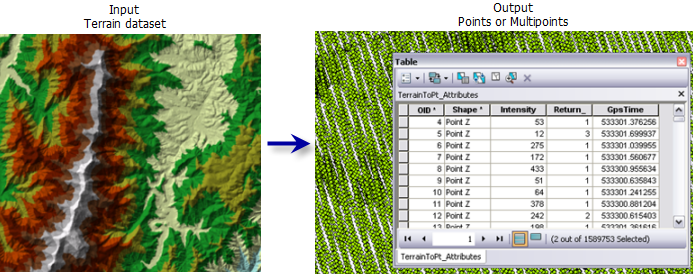| Label | Explanation | Data Type |
Input Terrain | The terrain dataset that will be processed. | Terrain Layer |
Output Feature Class | The feature class that will be produced. | Feature Class |
Pyramid Level Resolution (Optional) | The z-tolerance or window-size resolution of the terrain pyramid level that will be used. The default is 0, or full resolution. | Double |
Input Embedded Feature Class (Optional) | The name of the terrain dataset's embedded points to be exported. If an embedded feature is specified, only the points from the feature will be written to the output. Otherwise, all points from all data sources in the terrain will be exported. | String |
Output Feature Class Type (Optional) | The geometry of the output feature class.
| String |
Summary
Converts a terrain dataset into a new point or multipoint feature class.
Illustration

Usage
- Points are extracted for the specified pyramid level resolution and area of interest.
- If an embedded feature class is specified, the output points will only come from the embedded features. Otherwise, the output points will be derived from all points contributing to the terrain surface.
If an embedded feature contains lidar attributes, such as RGB, classification, or return values, the attributes will be written to the output feature class. However, the way the attributes are written will depend on the geometry type that is specified:
- MULTIPOINT—Attributes will be stored in BLOB field.
- POINT—Attributes will be stored in numeric fields.
Parameters
arcpy.ddd.TerrainToPoints(in_terrain, out_feature_class, {pyramid_level_resolution}, {source_embedded_feature_class}, {out_geometry_type})| Name | Explanation | Data Type |
in_terrain | The terrain dataset that will be processed. | Terrain Layer |
out_feature_class | The feature class that will be produced. | Feature Class |
pyramid_level_resolution (Optional) | The z-tolerance or window-size resolution of the terrain pyramid level that will be used. The default is 0, or full resolution. | Double |
source_embedded_feature_class (Optional) | The name of the terrain dataset's embedded points to be exported. If an embedded feature is specified, only the points from the feature will be written to the output. Otherwise, all points from all data sources in the terrain will be exported. | String |
out_geometry_type (Optional) | The geometry of the output feature class.
| String |
Code sample
The following sample demonstrates the use of this tool in the Python window:
arcpy.env.workspace = "C:/data"
arcpy.ddd.TerrainToPoints("sample.gdb/featuredataset/terrain", "terrain_points.shp",
pyramid_level_resolution=6, out_geometry_type="POINT")The following sample demonstrates the use of this tool in a stand-alone Python script:
'''*****************************************************************
Name: TerrainToPoints Example
Description: This script demonstrates how to use the
TerrainToPoints tool.
*****************************************************************'''
# Import system modules
import arcpy
# Set environment settings
arcpy.env.workspace = "C:/data"
# Set Local Variables
terrain = "sample.gdb/featuredataset/terrain"
outPts = arcpy.CreateUniqueName("terrain_pts", "sample.gdb")
outGeo = "POINT"
# Execute TerrainToPoints
arcpy.ddd.TerrainToPoints(terrain, outPts, 6, "<NONE>", outGeo)